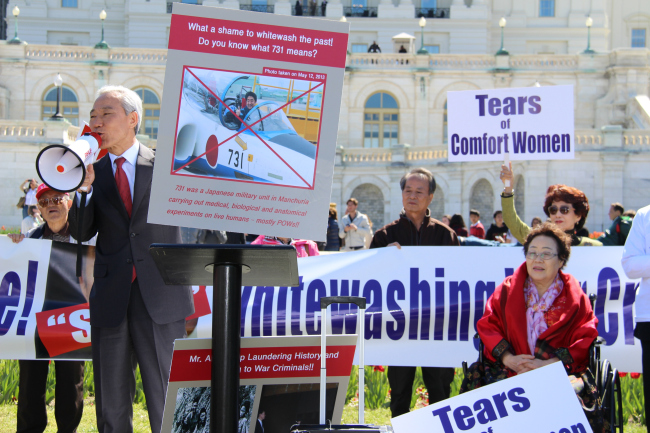‘U.S.-Japan cooperation takes aim at China’s assertiveness’
By Korea HeraldPublished : April 29, 2015 - 19:26
The U.S.’ and Japan’s stepped-up moves to keep an assertive China in check are expected to pose fresh regional tensions and delicate diplomatic tasks among the neighboring countries, analysts said Wednesday.

Washington and Tokyo have been beefing up security cooperation this week through their new defense guidelines and a joint alliance vision, warning China should not take any unilateral action to change the regional “status quo” in breach of international law.
“We are united in our resoluteness in opposing unilateral attempts to change the status quo in whatever form,” Japanese Prime Minister Shinzo Abe said during a joint press conference following his summit with U.S. President Barack Obama in Washington on Tuesday.
“Any dispute should be resolved peacefully based on international law and not through coercion or intimidation,” he added, apparently referring to the disputes that China has raised with Japan and other nations over a series of islands in the East and South China Seas.
Obama accused China of “flexing muscles,” noting that there are “real tensions” with China over its approach to maritime issues. He also said that a strong U.S.-Japan alliance should not be seen as a “provocation.”
“It should be seen as a continuation of the important work that we have done to ensure that you have a stable area where there are diplomatic conflicts (and) a healthy economic competition,” he said.
Analysts said that amid a strengthening of the U.S.-Japan alliance, China may try to avoid any critical confrontations with the U.S., and seek a milder form of diplomacy that would continue to expand its diplomatic and economic clout.
“China could utilize its creative imagination to enhance its clout instead of clashing with major powers in the region, although psychological conflicts with Japan could be amplified,” said Kim Heung-kyu, diplomacy professor at Ajou University.
Kim said that China may seek to maintain stable relations in the Western pacific area where conflicts persist, while pushing to advance toward its west through its “Silk Road” projects, open new opportunities in the country’s south and bolster cooperation with Russia, Mongolia and others north of China.
He added that amid stronger U.S.-Japan cooperation, countries in the Asia-Pacific may seek closer ties with the U.S., and their tendency to “bandwagon on” the rising power may weaken.
Some experts pointed out that given that the U.S. and Japan are beefing up their military cooperation to curb China’s aggressive behavior over maritime issues ― not to provoke or threaten China ― the allies’ enhanced security cooperation would not cause serious tensions in the region.
“Washington and Tokyo believe that deterring China or preventing any conflicts would be the best way to go. So, they seek to increase their monitoring and readiness with an ultimate goal of deterring China’s aggressive behavior,” said Nam Chang-hee, security expert at Inha University.
“Thus, I believe the allies’ moves to prevent any attempt at changing the status quo will be helpful to promote security in the region. But should Japan make moves that provoke China too much, then the allies may not be able to achieve an optimal deterrence against China.”
Observers said the moves to keep China in check would pose a tricky diplomatic challenge to South Korea, which has been striving to maintain stable relations with China, its biggest trading partner.
They said Seoul should employ a more active diplomacy to address the deadlock in the relations with North Korea and improve ties with Japan, so as to gain diplomatic leverage in the complicated power dynamics in Asia-Pacific.
By Song Sang-ho (sshluck@heraldcorp.com)
-
Articles by Korea Herald








![[KH Explains] Hyundai's full hybrid edge to pay off amid slow transition to pure EVs](http://res.heraldm.com/phpwas/restmb_idxmake.php?idx=644&simg=/content/image/2024/04/18/20240418050645_0.jpg&u=20240419100350)







![[From the Scene] Monks, Buddhists hail return of remains of Buddhas](http://res.heraldm.com/phpwas/restmb_idxmake.php?idx=652&simg=/content/image/2024/04/19/20240419050617_0.jpg&u=20240419175937)

![[KH Explains] Hyundai's full hybrid edge to pay off amid slow transition to pure EVs](http://res.heraldm.com/phpwas/restmb_idxmake.php?idx=652&simg=/content/image/2024/04/18/20240418050645_0.jpg&u=20240419100350)

![[Today’s K-pop] Illit drops debut single remix](http://res.heraldm.com/phpwas/restmb_idxmake.php?idx=642&simg=/content/image/2024/04/19/20240419050612_0.jpg&u=)